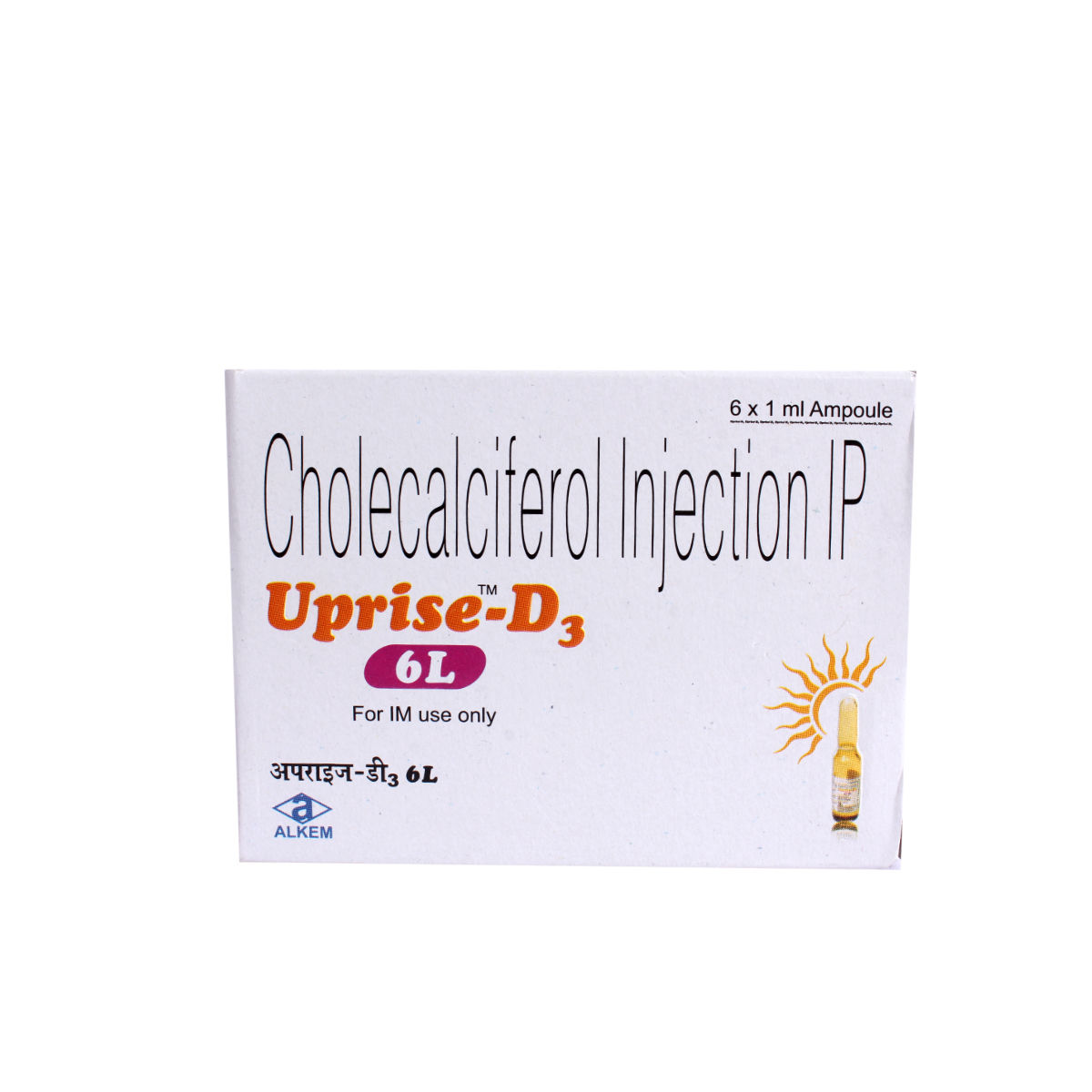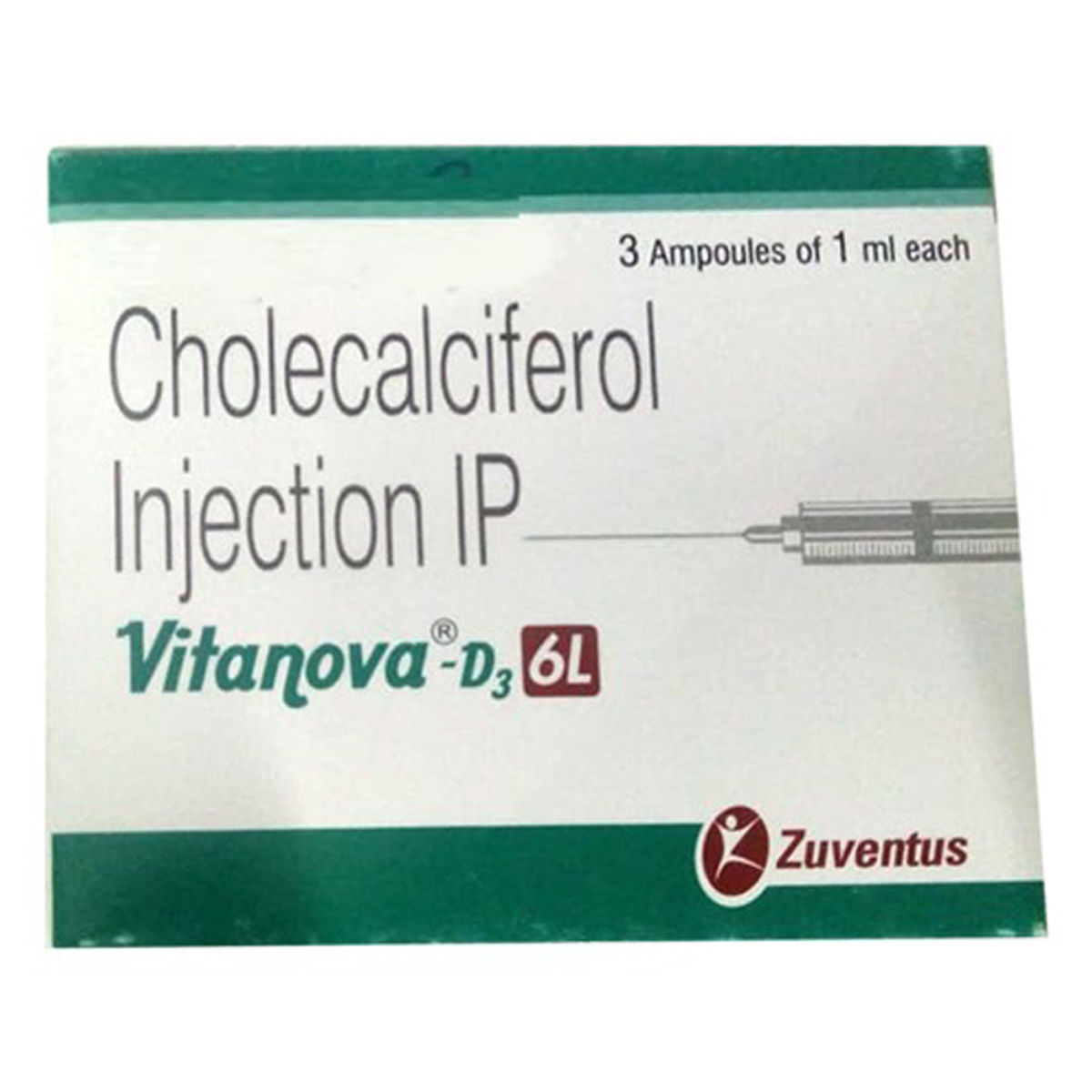Cholecalciferol
About Cholecalciferol
Cholecalciferol is a vitamin supplement primarily used to treat vitamin D deficiency. Vitamin D deficiency occurs when your body has low Vitamin D levels and is caused by inadequate nutrition, intestinal malabsorption, or lack of sunlight exposure. It effectively treats various conditions, including low calcium levels, osteoporosis (weak bones), and rickets or osteomalacia (softening of bones due to low calcium levels).
Cholecalciferol contains Cholecalciferol, a form of vitamin D. It promotes the absorption of calcium, phosphorus, and vitamin A from different organs and helps maintain overall health.
Cholecalciferol is likely safe to consume. In rare cases, it may cause side effects such as constipation, increased blood calcium levels, elevated calcium levels in urine, vomiting, and nausea. These side effects typically do not require medical attention and usually resolve gradually over time. If these side effects persist, please consult your physician immediately.
Take Cholecalciferol as advised. Your physician will decide the dosage based on your medical condition. You can take Cholecalciferol with or without food. It is advised not to take more than the recommended dose of Cholecalciferol. Do not chew, crush or break the medicine.
Inform your physician if you are allergic to Cholecalciferol. This medicine may contain sugar or aspartame. Hence, caution should be taken in diabetes and phenylketonuria (increased levels of an amino acid called phenylalanine). Let your doctor know if you have any liver/kidney disease, heart disease, kidney stones and hypervitaminosis D (having too much vitamin D) or are pregnant or breastfeeding before taking Cholecalciferol. Cholecalciferol is safe to use in children when recommended by the paediatrician.
Uses of Cholecalciferol
• Prevention of Vitamin D Deficiency: Cholecalciferol helps prevent vitamin D deficiency in people who don't get enough sunlight or have limited dietary sources of vitamin D.
• Support for bone health: Cholecalciferol supports bone health by aiding calcium absorption, which helps maintain strong bones and reduces the risk of fractures.
• Immune System Support: Cholecalciferol boosts the immune system, which can be especially beneficial during flu season or when you are more prone to getting sick.
• Management of Chronic Conditions: Cholecalciferol may help manage chronic conditions like rheumatoid arthritis and multiple sclerosis.
• Enhancing Mood and Mental Health: Cholecalciferol influence improve mood and reduce depression risk, making it a potential part of a comprehensive approach to mental health.
Medicinal Benefits
- Cholecalciferol is used to treat low blood calcium levels. It effectively treats various conditions in the body like Vitamin D deficiency, osteoporosis, hypoparathyroidism, latent tetany and rickets or osteomalacia.
- Cholecalciferol contains cholecalciferol (vitamin D3). Cholecalciferol is a steroid hormone produced in the skin when exposed to ultraviolet light or obtained from food sources.
- Cholecalciferol is a provitamin that is converted into a vitamin after intake. It helps maintain blood calcium and phosphorus levels and mineralization of bone.
- Cholecalciferol is also used in treating familial hypophosphatemia (a group of rare inherited disorders characterized by low phosphate levels resulting in deformities of the bones and teeth).
Directions for Use
• Cholecalciferol can be taken with food. • Follow your doctor's instructions on the dosage and timing of this medication. • Swallow Cholecalciferol as a whole with a glass of water. • Do not crush, break, or chew it.
Storage
Side Effects of Cholecalciferol
- Constipation
- Increased blood calcium levels
- Increased calcium levels in urine
- Vomiting
- Nausea
- Chest pain
- feeling short of breath
Drug Warnings
Tell your physician if you are allergic to Cholecalciferol. It may contain sugar or aspartame. Hence, caution should be taken in diabetes and phenylketonuria (increased levels of an amino acid called phenylalanine). Inform your doctor if you have any history of hypercalcemia, hyperparathyroidism, kidney disease, liver disease, electrolyte imbalance, heart disease, kidney stones and hypervitaminosis D (having too much vitamin D) before taking Cholecalciferol.
Pregnant or breastfeeding women should consult their physician before taking Cholecalciferol. Higher doses of Vitamin D than the recommended daily dose should be used in pregnant women only when advised by the doctor. Cholecalciferol is safe to use in children above 2 years of age only at the recommended dose. Your paediatrician will decide the dose of the medicine based on your child's age and body weight.
Store Cholecalciferol at room temperature away from sunlight. Do not chew, crush or break the medicine.. Keep the medicine out of reach of children. Do not take more than the recommended dose of medicine, as too much of vitamin D intake can lead to hypercalcemia (increased calcium levels in the body). It is always important to check for the expiry of the medicine. Discard the medicine if it reaches the expiry date.
Drug Interactions
Drug-Drug Interactions: Cholecalciferol may interact with drugs treating high cholesterol levels (cholestyramine), anti-epileptic (carbamazepine, phenobarbital), antibiotics (doxycycline, neomycin, and chloramphenicol), drugs treating bone loss (alendronate), thyroid hormone (levothyroxine), diuretics (hydrochlorothiazide) and heart-related medicines (digoxin).
Drug-Food Interactions: Avoid or reduce the intake of caffeine, soft drinks and alcohol that inhibit calcium absorption.
Drug-Disease Interactions: Cholecalciferol is contraindicated in hypercalcemia, hyperparathyroidism, hypervitaminosis D, malabsorption syndrome, Vitamin D toxicity, heart/kidney/liver/blood vessel diseases, kidney stones, diabetes and phenylketonuria.
Drug-Drug Interactions Checker List:
Safety Advice

Alcohol
cautionDrinking alcohol can affect calcium absorption; hence, it is advised to limit the alcohol intake while using Cholecalciferol.

Pregnancy
consult your doctorUse higher doses of Cholecalciferol during pregnancy than the daily dietary allowance only when the doctor advises. Your physician will weigh the potential risks and benefits before recommending Cholecalciferol.

Breast Feeding
consult your doctorConsult your physician before taking Cholecalciferol if you are breastfeeding. Cholecalciferol can pass into the breast milk. If Cholecalciferol is used during breastfeeding, please monitor the mother and the infant's serum calcium levels.

Driving
consult your doctorDo not drive or operate machinery if you experience dizziness while using Cholecalciferol. Please consult your doctor if you experience any dizziness.

Liver
consult your doctorBefore taking Cholecalciferol, let your physician know if you have any history of liver disease. Hepatic impairment/liver disease can alter certain Vitamin D forms' metabolic and therapeutic activity.

Kidney
consult your doctorIt is advised to seek physician advice before starting Cholecalciferol if you have kidney diseases like kidney stones or undergoing dialysis. Caution should be taken in dialysis patients to maintain adequate phosphorus levels and avoid ectopic calcification (calcium deposition).

Children
cautionThe physician will suggest the dosage of Cholecalciferol based on the child's age and weight.
Habit Forming
Diet & Lifestyle Advise
- Include dairy products like milk, yoghurt, cheese or milk-based custard in your diet.
- Eat a serving of broccoli, cabbage, spinach, and other green leafy vegetables daily.
- Include the best dietary sources of vitamin D, such as fish liver oils and vitamin D–fortified milk.
- Snack on calcium-rich nuts like Brazil nuts or almonds.
- Sprinkle sesame seeds over your food, vegetables and salads. Sesame seeds are high in calcium.
- Avoid or reduce the intake of caffeine, soft drinks and alcohol that inhibit calcium absorption.
- Replace the meat with tofu or tempeh for extra calcium in your food.
Special Advise
- Cholecalciferol may interfere with cholesterol tests; hence, please inform your physician and laboratory staff that you are taking Cholecalciferol before undergoing blood tests.
- Clinical monitoring of serum electrolyte concentrations and cardiac function is recommended.
Patients Concern
Disease/Condition Glossary
Vitamin D deficiency: When a person cannot get enough Vitamin D through food and exposure to sunlight, it leads to vitamin D deficiency. It often leads to thin, brittle, or misshapen bones.
Osteoporosis: It is a bone disease that weakens and brittle bones by decreasing bone density.
Osteomalacia: It is the softening of bones. It is most commonly caused by a condition that results in vitamin D deficiency, which aids in calcium absorption.
FAQs
Cholecalciferol is used to treat Vitamin D deficiency. Cholecalciferol effectively treats various conditions in the body like Vitamin D deficiency, osteoporosis (weak and brittle bones), and osteomalacia (softening or deforming of bones due to lack of calcium).
Cholecalciferol contains Cholecalciferol, a form of vitamin D. Cholecalciferol (vitamin D3) is a supplement that promotes the absorption of calcium, phosphates and Vitamin A from different organs and helps maintain overall health.
Cholecalciferol may cause common side effects like constipation, increased blood calcium levels, increased calcium levels in urine, vomiting, and nausea. These side effects do not require medical attention and gradually resolve over time. If these side effects persist, please consult your doctor immediately.
Cholecalciferol should be used with caution in conditions like hypercalcemia, liver problems, kidney problems, heart problems, hypervitaminosis, kidney stones, phenylketonuria and diabetes.
Cholecalciferol is used to increase low calcium levels in the body. Hence, it is not advised to use Cholecalciferol during hypercalcemia since it causes an overdose of calcium, leading to kidney stones and other effects.
If you miss a dose, take it as soon as you remember. However, if it is time for the next scheduled dose, skip the missed dose and follow your usual dosage.










